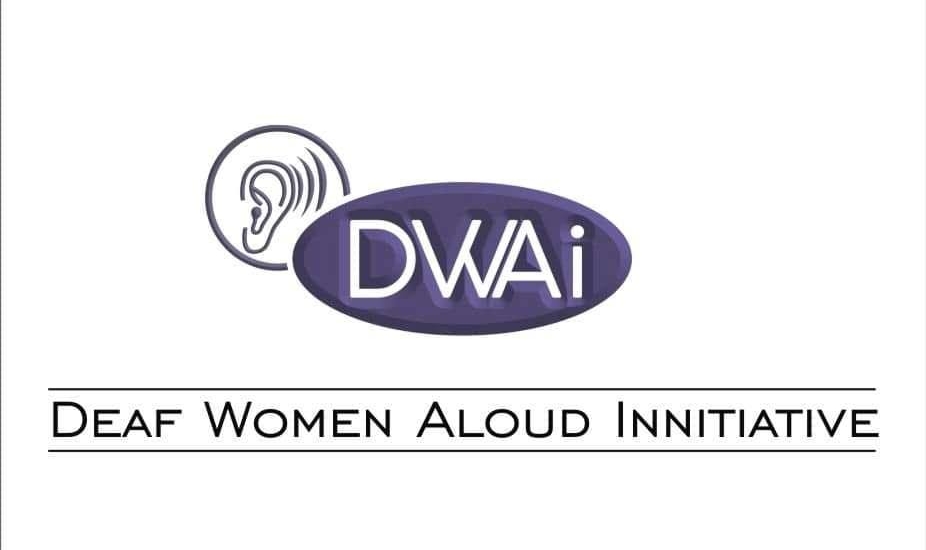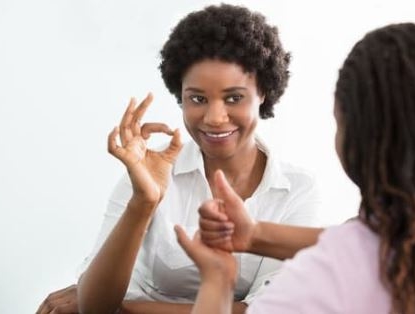Project
Increasing Access to Health Services and Information for Deaf Women
-
Amount Funded
24,690 EUROProject Duration
01 Jul 2019 - 30 Jun 2020 -
-
Lead organisation
-
The Deaf Women Aloud Initiative (DWAI) is a non-profit, non-partisan and communal association which started in 2001. The organisation amplifies the voices of deaf women in Nigeria and other African countries whose voices have drowned, using the UN Convention on the Rights of Persons with Disabilities (CRPD) and status-quo. DWAI exists to mitigate the exploitation of deaf women, eliminate discrimination, promote social inclusion and enhance secular participation of deaf women in Nigeria. DWAI promotes political participation of women with disabilities and rehabilitation of deaf women. The organisation also raises awareness among the general population about sensitive issues that affect deaf people, i.e. issues like sexual and reproductive Health Rights (SRHR), sexual abuse, gender-based violence, injustices, stigmatisation and discrimination. DWAI aims to promote policy formulation and its implementation to enhance the lives of people with disabilities.
-
Organisation
The Deaf Women Aloud Initiative (DWAI) is a non-profit, non-partisan and communal association which started in 2001. The organisation amplifies the voices of deaf women in Nigeria and other African countries whose voices have drowned, using the UN Convention on the Rights of Persons with Disabilities (CRPD) and status-quo. DWAI exists to mitigate the exploitation of deaf women, eliminate discrimination, promote social inclusion and enhance secular participation of deaf women in Nigeria. DWAI promotes political participation of women with disabilities and rehabilitation of deaf women. The organisation also raises awareness among the general population about sensitive issues that affect deaf people, i.e. issues like sexual and reproductive Health Rights (SRHR), sexual abuse, gender-based violence, injustices, stigmatisation and discrimination. DWAI aims to promote policy formulation and its implementation to enhance the lives of people with disabilities.
-
Project
Increasing Access to Health Services and Information for Deaf Women project facilitates the provision of sign language interpretation service within the health system in Abuja and Enugu. The project employs the use of capacity strengthening, advocacy and sensitisation to mobilise the deaf community and other key stakeholders including civil society organisations (CSOs), the media, and youth groups. Deaf Women Aloud Initiative (DWAI) is working with trained leaders to adopt and implement developed work plans to mobilise key stakeholders in their communities to engage key health decision-makers including management of health facilities, local government and other Government Ministries, Departments and Agencies (MDA) officials to ensure the development of policies that facilitate the provision of sign language interpretation systems within health facilities in Abuja. The capacity of selected deaf women and youth leaders is strengthened on leadership, advocacy, lobbying and sensitisation to be able to lead the process in their community.
-
-
Increasing Access to Health Services and Information for Deaf Women project facilitates the provision of sign language interpretation service within the health system in Abuja and Enugu. The project employs the use of capacity strengthening, advocacy and sensitisation to mobilise the deaf community and other key stakeholders including civil society organisations (CSOs), the media, and youth groups. Deaf Women Aloud Initiative (DWAI) is working with trained leaders to adopt and implement developed work plans to mobilise key stakeholders in their communities to engage key health decision-makers including management of health facilities, local government and other Government Ministries, Departments and Agencies (MDA) officials to ensure the development of policies that facilitate the provision of sign language interpretation systems within health facilities in Abuja. The capacity of selected deaf women and youth leaders is strengthened on leadership, advocacy, lobbying and sensitisation to be able to lead the process in their community.
-
“While I was lying down on the bed in the labour ward, the doctor was saying ‘madam push, push, push’, but I could not hear him. Likewise, the nurses were hitting me but I did not know what they were saying. I only realised that my baby is coming out when I felt the doctor touch the head. They stitched me without any communication and when I finally asked, they told me that my baby’s head was big and so gave me a cut’. Mrs, Helen Udoye Beyiok- Alase, Voice Project Lead, Deaf Women Aloud Initiative.
‘Health is wealth’ is indeed an agelong saying that remains true even with the changing times. For the government and citizens, access to health is sacrosanct. Unfortunately, the limited access to resources (especially for developing countries) make it difficult to accord health the needed attention and especially for People with Disabilities (PWDs). For instance, in ensuring access to health for a person with hearing impairment, an investment in communications is critical. Thus in addition to all the considerations to be made for others, a person with hearing impairment requires this additional support. This is even worse for women with disabilities as they experience double marginalisation.
Mrs. Helen Udoye Beyiok- Alase is a woman with hearing impairment. When she found out that she was pregnant for the first time, like every other expectant mother, she was over the moon. She registered for antenatal services at a local clinic hoping to get all the support she needed, alas the experience turned into a nightmare as her pregnancy progressed. She would leave her home very early in the morning so that she could be among the first few pregnant women to arrive at the hospital, yet end up being the last to leave the hospital due to communication barriers. Often, her hospital card would be abandoned after the nurses have repeatedly called her name without response. All her efforts to get the attention of the nurse and other health workers when they were calling out names were frustrated as they shout her down and order her to sit down. Throughout the period of her painful labour, Hellen could not explain to the nurses how she felt. She muttered some sounds but no one could understand what she meant. Even when she felt the baby’s head, the nurses were nowhere to be found and she could not call out to them. Hellen laid in the labour room panicking that something bad would happen if the baby arrived and nurses were not around. Luckily, a nurse came in to check and saw her state. It was a similar experience with her second pregnancy, which caused her more anxiety as her due date drew closer, simply because she knew communication would be a challenge during delivery. She recalled that during labour, she screamed, cried, groaned heavily in pain not just because of the delivery process but because there was no one who could understand her.
The project aimed at enhancing access to health for women & girls with hearing impairment with particular focus on communication and protecting the confidentiality of rightsholders while accessing health services. The proudest moment of the project was the development of a glossary for sexual and reproductive health rights for women with hearing impairment, with sign language. This tool is designed to facilitate confidential and independent engagement between rightsholders and health workers, made simple by the signs and symbols contained in the glossary. The glossary was launched and adopted by all primary health care facilities in the Federal Capital Territory, Abuja(FCT) and health workers have received initial training on the tool to understand what the symbols stand for and how they can use and maximise impact for the rightsholders.
The most impactful aspect of the project is the fact that rightsholders can now access hospitals within the FCT, in confidence knowing that their privacy is secured and integrity upheld. It is very empowering for them to know that they can do little things such as- a visit to the doctor, on their own, just like other women. The project has also established a mutual synergy between health workers in the FCT and the rightsholders as they worked on the glossary together, got to learn about each other’s vulnerabilities more. Thus, when they see women with hearing impairment, they pay attention to their needs.
- News




